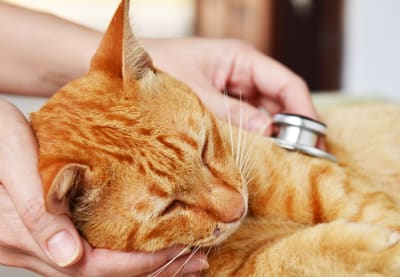What causes pneumonia in cats?
If viruses, bacteria or fungal organisms invade your cat’s airways and nostrils, an infection or inflammation can develop, which may lead to pneumonia. This condition can result in breathing challenges and oxygen deficiency in the blood, which can weaken your cat’s immune system.
Though cats of any age can be diagnosed with pneumonia, it’s most often seen in very young kittens, cats with underlying health conditions or senior cats. Cats can contract pneumonia in a number of ways:
Infectious Pneumonia
The most common form of pneumonia seen in cats, infectious pneumonia can be caused by a bacterial or viral infection in the airways and lungs.
Aspiration Pneumonia
If your cat inhales foreign material, this can lead to the sensitive lining of the lungs becoming irritated. The improper administration of liquid medications or inhalation of vomit (if your cat is sick) are common causes of aspiration pneumonia.
Fungal Pneumonia (also called mycotic pneumonia)
A fungal infection can progress to develop into fungal pneumonia. The source of most fungal infections in cats is believed to be the inhalation of spores from soil.
Parasites
In some cases, parasites such as flukes and lungworms may invade the cat’s air passages and cause pneumonia.
How can I tell if my cat has pneumonia?
Pneumonia is not always easily detectable in cats as many of the symptoms are also associated with other illnesses, including other respiratory infections such as cat colds.
Nonetheless, your cat may exhibit one or more of these symptoms if they are suffering from pneumonia:
- Rattling or gurgling respiratory sounds
- Lack of appetite
- Bluish mouth
- Fever
- Nasal discharge
- Coughing up blood or mucus
- Labored or shallow breathing
- Persistent coughing
- Untidy appearance
- Lethargy
- Unusually fast rate of breathing
- Weight loss
Other symptoms such as vomiting, increased heart rate and difficulty swallowing may also appear with aspiration pneumonia. Cats with fungal pneumonia may also display symptoms such as problems with their skin or eyes, such as skin lesions, runny eyes and lameness.
Can cats contract pneumonia from other cats?
Cats suffering from bacterial or viral pneumonia can pass the infection on to other cats, small animals and dogs they come into close contact with.
To help prevent pneumonia from spreading, keep your sick cat separated from other pets in your home by containing them in a separate but comfortable room. Offer your sick cat a comfortable place to rest, plenty of food and water, and a clean, fresh litter box.
Your cat’s litter box, in addition to their toys, water and food bowls, should be cleaned frequently. You should also wash your hands thoroughly after handling or petting your ill cat.
Will my cat recover from pneumonia?
If your cat is diagnosed with pneumonia, your vet will start treatment to stabilize your cat’s condition and begin to fight the infection.
Based on how severe your cat’s symptoms are, treatment can potentially include hospitalization for close monitoring, a nebulizer treatment to help ease respiratory symptoms, oxygen therapy and intravenous fluids to treat dehydration. They may also receive antifungal medications or broad-spectrum antibiotics to help fight the infection.
The prognosis is generally good for cats that receive treatment for pneumonia early enough. However, aspiration pneumonia is particularly challenging to treat and may lead to further complications later in life. Your cat’s general health, age and the underlying cause of illness will all factor into how well your cat recovers from pneumonia.
Sadly, cats that are immunocompromised, very old, or very young may not be strong enough to defeat a severe case of pneumonia.
Note: The advice provided in this post is intended for informational purposes and does not constitute medical advice regarding pets. For an accurate diagnosis of your pet's condition, please make an appointment with your vet.
Is your cat showing symptoms of pneumonia or having challenges breathing? Contact your vet or the nearest emergency animal hospital. At Animal Hospital of Clemmons, we provide preventive and emergency veterinary care for cats and dogs in Clemmons and greater Winston-Salem.
Looking for a vet in
Clemmons?
We're always accepting new patients, so contact our veterinary hospital today to book your pet's first appointment.
Related Articles View All
How often do you take a cat to the vet?
Regular checkups including vaccines and parasite control play a key role in helping your kitty achieve a long and healthy life. So, how often should you take a cat to the vet? Today we share general guidelines recommended by most veterinarians.
Exploring Cat Dental Health - Gingivitis
Is your cat refusing to eat, or losing weight? It could be due to a dental health problem such as gingivitis. Read on to learn about the signs and how gingivitis in cats can be treated.
The Best Way to Travel With a Cat
Planning a trip away from home and want to take your feline friend along with you? Here are a few helpful tips from our Clemmons team to help make the journey an enjoyable experience for both you and your cat.
Kitten First Vet Visit - What to Expect & What it Will Cost
Have you welcomed a beautiful new kitten into your heart and home? If so, early veterinary care can help to set your tiny fur baby on the path to excellent life-long health. Today, our Clemmons vets discuss kitten first vet visits.
How to Tell if Your Cat Has a Broken Leg
Regardless of whether your cat is a curious outdoor explorer or a chilled-out homebody, accidents can happen. Today, our Clemmons vets share signs that may indicate that your cat has a broken leg, and what you should do.

